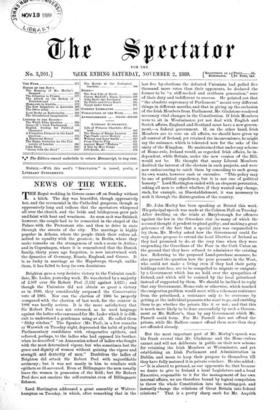last five by-elections the defeated Unionists had polled five thousand
more votes than their opponents, he declared the former to be "a stiff-necked and stubborn generation," sure of their duty and indifferent to success. He pointed out that " the absolute supremacy of Parliament " meant very different things in different mouths, and that in giving up the exclusion of the Irish Members from Parliament, Mr. Gladstone rendered necessary vital changes in the Constitution. If Irish Members were to sit in Westminster, yet not deal with English and Scotch affairs, England and Scotland must have a new govern- ment,—a federal government. If, on the other hand, Irish Members are to vote on all affairs, we should have given up all control of Ireland, yet retained the inconvenience, he might say the nuisance, which is tolerated now for the sake of the unity of the Kingdom. He maintained that under any scheme of Home-rule, Ireland would, as regarded Irish affairs, be in- dependent, while Britain, under the new version of the Bill, would not be. He thought that many Liberal Members doubted the interest of the electors in such projects, and were now endeavouring to catch them by conceding to each group its own wants, however rash or excessive. " This policy may be one of political expediency, but it is not one of political honesty." Lord Hartington ended with an eloquent peroration, asking all men to reflect whether, if they wanted any change, such, for example, as Disestablishment, it was necessary to seek it through the disintegration of the country.


















































